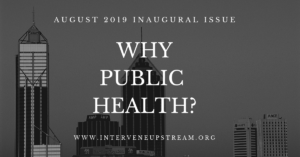Three Evidence-Based Reasons to support Intervene Upstream
1. We cultivate professionalism through reflective writing:
Active, written reflection facilitates technical and problem-solving skills, and cultivates professionalism among MPH students.1 Rogers2 explains that :
“Reflective practices that are intellectually credible can promote resiliency and resourcefulness in the face of life’s dynamic challenges and encourage habits of individual and collective attention and analysis that can sustain higher education as it works to address the problems of society.”
2. We improve writing and critical thinking skills:
Writing acculturates students to disciplinary practices in public health and fosters critical thinking.3 Since public health professionals engage with many different documents (grants, press releases, scientific publications, etc.), written communication is a necessary competency at all levels of public health education.4 Publishing in Intervene Upstream gives students a chance to process, evaluate, and make sense of written public health content which is an essential aspect of public health work & education.
3. We create inter-disciplinary and geographically diverse networks of future public health leaders:
Intervene upstream incorporates the five talents for effective leadership development in public health.5 Graduate students across discipline run the entire publication; as such, we have the opportunity to sit on the editorial board, shape the future of the publication, network with peers, read & write public health content, and advocate for a collective graduate student voice.
- Series 4– Public Health Solidarity - September 15, 2020
- Inequity, Domination, and Liberation during COVID-19 - September 15, 2020
- Archive – The Palate, Nutrition and Public Health - July 6, 2020
- Merzel, C., & Goodman, A. (2016). Becoming a Professional. Pedagogy in Health Promotion, 2(3), 154–160. https://doi.org/10.1177/2373379916656639 [↩]
- Rogers R., R. (2001). Reflection in Higher Education: A Concept Analysis. Innovative Higher Education, 26(1), 37–57. Retrieved from https://link-springer-com.eaccess.ub.tum.de/content/pdf/10.1023%2FA%3A1010986404527.pdf%0Ahttp://10.0.3.255/A:1010986404527 [↩]
- Mackenzie, S. L. C. (2018). Writing for Public Health: Strategies for Teaching Writing in a School or Program of Public Health. Public Health Reports, 133(5), 614–618. https://doi.org/10.1177/0033354918785374 [↩]
- Council on Education for Public Health (CEPH). (2016). Accreditation Criteria: Schools of Public Health and Public Health Programs, (October). Retrieved from www.ceph.org [↩]
- Day, M., Shickle, D., Smith, K., Zakariasen, K., Moskol, J., & Oliver, T. (2014). Training public health superheroes: five talents for public health leadership. Journal of Public Health, 36(4), 552–561. https://doi.org/10.1093/pubmed/fdu004 [↩]




